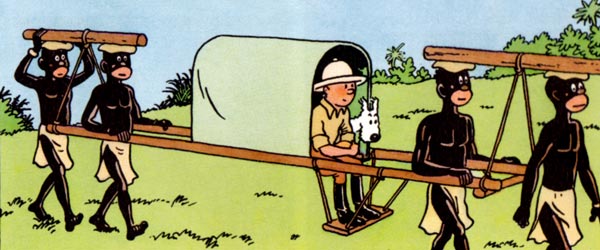In the 1930's, Belgium, France, Great Britain and a few other countries had vast colonial empires. This does not mean that all Europeans considered the colonised populations as inferior. It is clear that many stereotypes accepted at the time are no longer possible today.
I regret that the word "Negro", which originally referred to a man with black skin, is now totally unacceptable. According to the French lexicographer Littré (1873) a negro is the "name generally given to the black inhabitants of Africa". But he already adds a second meaning: "black slave", and he attaches the expression "to work like a negro", to do a hard work and without relent.
This is why — because of the slavery, although it was abolished in the nineteenth century — the word Negro definitely has a contemptuous connotation. However, it must be admitted that it remained in force in French until the 1950s, without its current use being open to criticism.
Subsequently, the term "petit-nègre" which characterized a pidgin French allegedly spoken by some Africans, and found in the "bubbles" of Tintin in the Congo, also became politically incorrect, and the texts of some Tintin albums have been corrected (but not much in Tintin in the Congo).
In the United States, where the "politically correct" epidemic is particularly virulent, there is a desire to sanitize certain texts by Mark Twain (1835 - 1910) that contain the word negro. "If we begin to practice such censorship, we will have to do it in some Martin Luther King texts, which also contain the word Negro," noted a Canadian law professor.
In an article by Eduardo Rolland published in "La voz de Galicia" on 17 June 2011, the author pointed out that if Hergé were to be condemned for racist remarks, many other authors would have to be pilloried, starting with Homer who, in the Iliad as in the Odyssey, proves to be a complete macho, and that even the Bible should not be put into all hands because of the monstrosities that can be read in the Old Testament. If you want to read this article (in Spanish), here is the URL. In short, one can not judge the writings of yesterday with the mentality of today.
Hergé lived in his time, and probably did not think much about the colonies and the human race. The character of Tintin is nevertheless fundamentally tolerant and philantropic. That is why those who want to prohibit the distribution of Tintin in the Congo under the pretext of racism are fools.
22 September 2017

